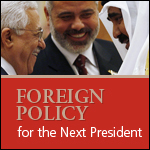During the campaign, President-elect Obama emphasized the need for greater diplomacy and a willingness to engage with hostile regimes. This commitment to “return to diplomacy” will not be enough to break the deadlock in the Middle East. Obama should break from traditional U.S. posture and support peace initiatives originating with Arab countries, urges a new paper by the director of the Carnegie Middle East Program.
Marina Ottaway explains that the United States lacks the legitimacy and capacity to monopolize leadership in the peace process. The new administration should signal its support for three key Arab undertakings: Syrian–Israeli negotiations under Turkish leadership, Hamas–Fatah talks brokered by Egypt, and the Arab–Israeli initiative most recently proposed by Saudi Arabia.
Key Conclusions:
- Supporting Arab-sponsored talks transfers responsibility to regional players, who have not yet made the sustained efforts necessary to turn a proposed plan into a workable agreement.
- By engaging in talks with Iran and Hamas, the United States would send a clear signal to the region—it is impossible to make peace without dealing with your enemies. If Arab countries want peace with Israel, they need to negotiate directly with Israel.
- By sharing the burden with regional actors, the United States can avoid repeated diplomatic defeats.
- The Obama administration should abandon efforts to build a Cold War-style coalition against Iran. Despite enthusiasm about the new president, Gulf countries remain extremely vulnerable to attacks by Iran and have no interest in provoking one. The United States should support—but not initiate—a regional dialogue with Iran and its neighbors on common interests.
Ottaway concludes:
“The new administration needs to rethink the U.S. role in the politics of the Middle East, abandon the assumption that it must be at the center of every initiative, build on what the regional countries are trying to do, and, in the process, encourage them to take more responsibility. At a time when American solutions appear deadlocked and the new president will have to concentrate his attention on the economy, sharing the burden provides a way forward.”





